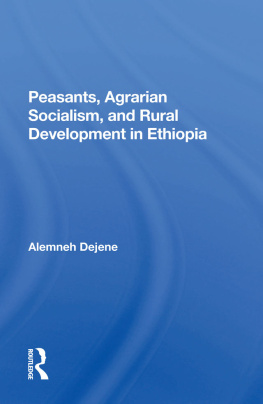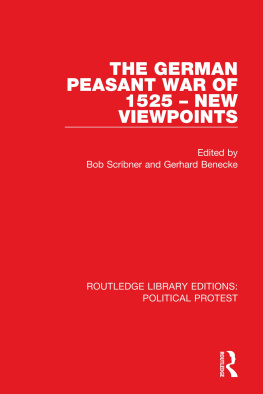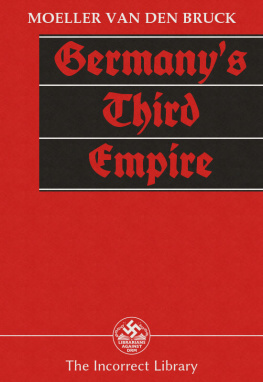1986 by The University of North Carolina Press
All rights reserved
Manufactured in the United States of America
Library of Congress Cataloging-in-Publication Data
Moeller, Robert G.
German peasants and agrarian politics, 19141924.
Bibliography: p.
Includes index.
1. PeasantryGermanyPolitical activityHistory20th century. 2. Agriculture and stateGermanyHistory20th century. 3. GermanyPolitics and government20th century. 4. GermanyHistory20th century. I. Title.
HD1536.G3M64 1986 322.440943 85-14120
ISBN 0-8078-6570-2
For my parents, Marian S. and H. G. Moeller
Contents
ONE
Learning to Complain without Suffering: Peasant Farming in the Kaiserreich
TWO
Defining the Agrarian Interest in the Wilhelmine Age
THREE
The War at Home: Agrarian Protest and the Controlled Economy
FOUR
The Tumultuous Transition from War to Peace
FIVE
Inflation and Peasant Protest in the Early Years of Weimar
SIX
Rejecting the Republic: Agrarian Politics, 19201923
SEVEN
Epilogue: Toward 1933
Acknowledgments
Why German peasants? Like many other students of modem German history, I came to my subject because of a fascination with the collapse of the Weimar Republic and the triumph of National Socialism. In most accounts of these events peasants were typically presented as particularly zealous opponents of Weimar, but their antagonism toward democratic institutions was more often asserted than explained. I was interested in the political behavior of groups in the middlebetween capital and laborin a period of sustained crisis, and a study of the peasantry in Weimar seemed an excellent way to explore this topic.
In the years that have passed since the inception of this project, I have accumulated many, many debts. The late Geoffrey Barraclough, then at Brandeis University, convinced me of the potential significance of systematic work on the German peasantry. At the University of California, Berkeley, Hans Rosenberg, then emeritus, generously gave of his time and counsel in the early stages of my dissertation research. That work was supervised by Gerald Feldman, who has remained an excellent critic and colleague, and whose influence on this book will be immediately apparent to those who know his important studies of the First World War and Weimar. Jan deVries also provided excellent advice and made me aware of the ways in which historians can learn from economists. During fifteen months of research in Germany, Hans-Jrgen Puhle saved me from the potential isolation of archival work, and he has commented on more than one version of the manuscript since.
Funding for my research was provided in the earliest stages by the German Academic Exchange Service and the Council for European Studies, and later by the Social Science Research Council, the Stiftung Volkswagenwerk, and, most recently, by the Columbia University Council for Research in the Social Sciences. The generous support of these institutions was invaluable. Ann Keisling, who spent a long year with the German peasantry, was an excellent research assistant. She and Alexander Wells helped with the final stages of manuscript preparation. Special thanks are due the archivists in the Federal Republic of Germany and the German Democratic Republic who helped to lead me through the documents. Martin Schumacher made me aware of the extensive resources of the Landwirtschaftskammer Rheinland, whose officials graciously granted me access to it and to materials now in the Nordrhein-Westflisches Hauptstaatsarchiv in Dsseldorf. The librarians of the Landwirtschaftskammer Westfalen-Lippe similarly allowed me to work in their invaluable collection of rare, published sources. Crucial for my work as well were the personal papers of Engelbert Freiherr Kerckerinck zu Borg; my thanks to his son, Max Freiherr Kerckerinck zu Borg, who granted me permission to use this collection, and to Max Freiherr von Twickel, formerly of the Landschaftsverband Westfalen-Lippe, who first informed me of this rich source.
The progression from dissertation to book was greatly facilitated by my participation in a multi-year project, funded by the Stiftung Volkswagenwerk, that investigated Inflation and Reconstruction in Europe, 191424. The opportunity to meet regularly over a five-year period with German, American, and British colleagues offered me many occasions to discuss my work and to learn from the criticisms and ongoing research of the other members in the project. In particular, I am grateful for the insights offered by Jens Flemming, Carl-Ludwig Holtfrerich, Claus-Dieter Krohn, Andreas Kunz, Jonathan Osmond, and Peter-Christian Witt. In addition, I learned much from discussions of my work at Princeton Universitys Shelby Cullom Davis Center, Columbia Universitys Seminar in Economic History, and the New York University Seminar in European Social History.
I also benefited enormously from the critical comments of friends and colleagues who took time from their own work to respond to mine. David Abraham, David Blackboum, Shearer Davis Bowman, Jane Caplan, James Cronin, David Ringrose, Ronald Ross, Reinhard Rurup, Hanna Schissler, and Reginald Zelnik have commented on parts of the manuscript. Renate Bridenthal, Robert Edelman, Geoff Eley, William Mathews, and Mary Nolan all read through the dissertation or early versions of this manuscript, offered a range of critical perspectives that forced me to define my own more carefully, and lent me the encouragement and support that helped me through the final stages of completing the manuscript. I first met Thomas Childers and Larry Jones in the Inflation and Reconstruction research group; both offered valuable suggestions for my work in that project, and both undertook a close critical reading of an earlier version of this manuscript as well. Their constructive comments were extremely useful, and they unselfishly shared with me their own considerable knowledge of Weimar. Both have contributed much to making this a better book. Lewis Bateman, my editor, provided consistently sound advice as well.
Thanks are also due to the editors of the following journals for permission to use parts of materials that they first published: to Agricultural History for Peasants and Tariffs in the Kaiserreich: How Backward Were the Bauernl; and to Central European History for Dimensions of Social Conflict in the Great War: The View from the German Countryside. The editors of Die deutsche Inflation: Eine Zwischenbilanz (Berlin, 1982) also granted permission to use parts of Winners as Losers in the German Inflation: Peasant Protest over the Controlled Economy 19201923, which first appeared there.
The assistance offered by Heidrun Homburg and Josef Mooser deserves special note: not only have they given me intellectual support throughout the entire project, they have also repeatedly offered hospitality and friendship to sustain me through numerous research trips to Germany. In this country, my intellectual and emotional life has been vastly improved by Lynn Mally, who took time from her own studies of Russian workers and proletarian culture to learn far more about Rhenish and Westphalian peasants than she had ever hoped or wanted to.





